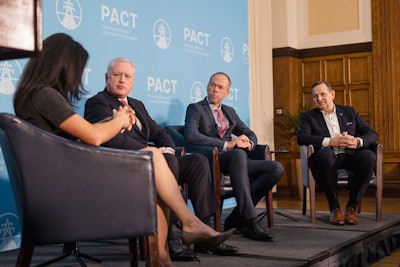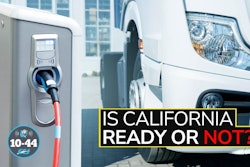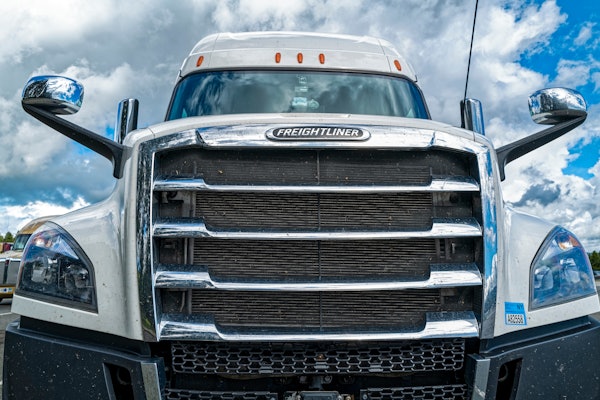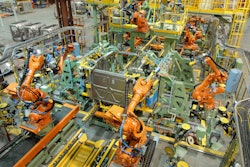
Volvo Trucks North America, Navistar and Daimler Truck North America are fierce competitors for marketshare, but when it comes to shrinking transportation's carbon footprint they're taking a "we're all in this together" approach.
The three North American brands – manufacturers of Volvo, Mack, International, Freightliner, Western Star and Rizon electric trucks, representing 70% of all new Class 6-8 truck sales in the U.S. – on Tuesday announced a collaboration: Powering America’s Commercial Transportation (PACT), a deal that calls for the three OEMs to focus on education and advocacy for accelerating the construction of national infrastructure for medium- and heavy-duty zero-emission vehicles (ZEVs).
The agreement stateside comes on the heels of one the trio finalized in Europe in 2022 that calls for Volvo Group, Daimler Truck, and Navistar parent Traton to jointly install and operate a high-performance public charging network for electric, heavy-duty, long-haul trucks and buses – an investment of nearly $550 million collectively headquartered in Amsterdam, Netherlands. Operating under the name Milence, the European joint venture calls for the installation and operation of at least 1,700 high-performance green energy charging points on and close to highways, as well as at logistic and destination points by 2027.
Navistar President and CEO Mathias Carlbaum noted that North American commercial vehicle customers need fast, reliable, affordable and convenient power to effectively deploy ZEV fleets at scale, and that kind of infrastructure is lacking on all fronts. According to the International Council on Clean Energy Transportation, nearly 600,000 chargers will be needed nationwide to accommodate a projected 1.1 million class 4-8 medium- and heavy-duty ZEVs anticipated to be deployed by 2030, which will consume 140,000 megawatts of electricity every day, equivalent to the monthly energy needs of 4.9 million American homes.
"The scale of infrastructure required for medium- and heavy-duty EV adoption is unprecedented," said Stephen Roy, president of Mack Trucks and chairman of Volvo Group North America.
Daimler Truck North America President and CEO John O'Leary noted that "the transition to zero-emission vehicles is stalling without the deployment of the needed charging infrastructure."
“We need some help,” O’Leary said during PACT’s launch at the National Press Club in Washington D.C.
Speaking alongside OEM presidents, Navistar’s Carlbaum and Volvo Trucks North America President Peter Voorhoeve, O’Leary stated the PACT’s premise of working toward the same vision and goal as an industry. “We want other players out there, whether it’s utilities, equipment manufacturers, [and] all that – we need everybody in this game together and then all rowing in the same direction," he said.
Leaders have a distinct responsibility, said Voorhoeve; “Partnership is the new leadership.”
Carlbaum echoed the call for collaboration. “The footprint of transportation in the U.S. is very favorable for electrification," he said.
Education and advocacy at its core
 Dawn Fenton, vice president of public affairs for Volvo Group and chairperson of PACT.PACT
Dawn Fenton, vice president of public affairs for Volvo Group and chairperson of PACT.PACT
Dawn Fenton, vice president of public affairs for Volvo Group and PACT chairperson, emphasized PACT’s focus on education, ranging from legislators, regulators, fleet owners, utilities and other policy makers.
Fenton explained that the coalition aims to engage in legislation cycles in various states and utility rate cases. It would also publish materials, fact sheets and white papers, as well as conduct meetings and events to promote engagement.
Having stakeholders together is a step toward identifying roadblocks and issues, said Fenton. “Just getting some of these stakeholders at the table together, we can identify and figure out, ‘What can we do quickly? Where can the infrastructure move quickly?’”
While supporting the deployment of commercial ZEV infrastructure, PACT will not advocate for specific vehicle, power generation, or utility distribution technologies. PACT exists to educate stakeholders about infrastructure challenges that hamper medium- and heavy-duty ZEV adoption in the marketplace and work with stakeholders to find solutions for the benefit of all interested parties. The coalition also champions practical and efficient infrastructure solutions capable of supporting increasing commercial truck ZEV deployments.
“We will need to educate governors, legislators and public utility commissioners [and], I think to some degree, local elected officials when it comes to permitting reform and streamlining,” said Brien Sheahan, interim head of government affairs at Navistar and PACT coalition member, prior to the launch event. “At the end of the day, all of these investments will be approved by state public utility regulators, so they’re probably the center of that group of policymakers that we need to focus on.”
In terms of advocacy, Sheahan stated it will come in the form of legislative initiatives and participating in utility rate cases to support the utilities’ investment and infrastructure. "Our intent is to lobby and actively participate in rate cases to help stakeholders and regulators understand the importance and benefits of this transition," he said.
"We need a diverse group of members in order to be successful," added Fenton, talking about coalition’s members.
Coalition membership is open to all stakeholders with an interest in accelerating the deployment of zero-emission commercial vehicles and the requisite infrastructure, including other OEMs, infrastructure developers, electric utilities and grid operators, and others. Founding members include ABB E-mobility, Burns & McDonnell, the British Columbia Hydro and Power Authority, Greenlane, Prologis Inc., and Voltera.
Besides its 10 founding members, Fenton explained that the coalition consists of various levels of membership, such as charter members who will have an automatic seat on the board, principal members and supporting members.
“We will be expanding the board, [and] there would be kind of elections who would be joining the board,” said Fenton. “An important point to make is, everybody, regardless of what level, will have a voice in creating the policies, strategies and plans going forward. We really need the voice of all stakeholders to be successful."












